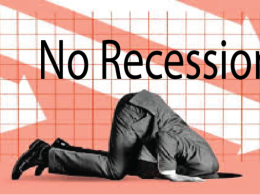2010 Review/2011 Outlook
by Capital International Asset Management
Please click on images for video
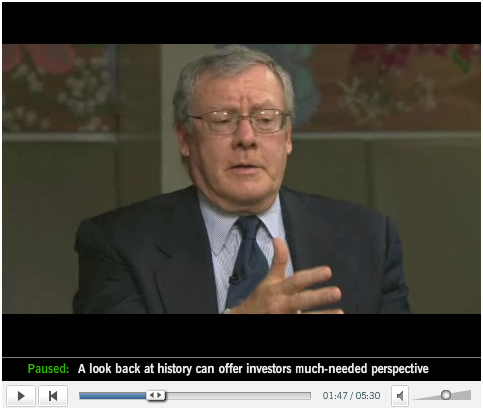 1. A look back at history can offer investors much-needed perspective
1. A look back at history can offer investors much-needed perspective
Kevin Clifford: Hello. This is Kevin Clifford, president of American Funds. I'm here with three of our senior portfolio [managers] to take a look back at the developments that shaped the investment landscape in 2010, as well as discuss the outlook for global equity and fixed-income markets.
Joining me for today's discussion are Jim Rothenberg, Rob Lovelace and Jim Mulally. Jim, Rob, Jim, thank you very much for being with us today.
You all have just come back from some time in the field talking to advisors. In reading the notes, one of the themes that just runs through this is how do you explain to advisors that it's safe to go back in the water - that this is the time to be thinking seriously about building globally diversified, balanced portfolios. What did that discussion sound like, Jim, from your perspective?
Jim Rothenberg: One of the messages we heard loud and clear out there in the field is many of the clients have been frightened. They were frightened by what happened in 2008-09, how much money was lost. They were frightened by the flash crash in May. So I think there is a really pervasive and deep concern on the part of investors, which is manifested where the flows are going in the industry.
But I think it's important to take a step back. There have been some other times when the world looked pretty ugly. When I started in the business, we had two recessions: 1969-70 and 1974-75. We had two big jumps in the price of oil, from $3 to $12 to $36. I bought my parents a 14.75%, non-callable, 30-year U.S. Treasury bond. You had 22% short rates at a moment in time. And we lost the war in Vietnam. And the president [of the United States] was impeached.
So all of that - when you think about it - was a pretty ugly time. And by the way, [it] was long - it wasn't short. It was about 12 years, the time frame I'm talking about. And yet, at the end of that time frame, if you went back and looked at BusinessWeek or The Wall Street Journal, nobody was forecasting what then unfolded in 1982-2000, which was one of the better market periods that we've seen in history, with a compound growth rate in the U.S. equity market in the high teens.
So I think that perspective - what I tried to convey to some of the advisors that we visited - is that, no, this game is not over, in the sense that everything we read is pessimistic today. And it is. It's mostly about pessimism. But again, I go back to individual companies. There are many companies who are growing their earnings streams, growing revenues, finding places around the world where they can see growth and who are doing a good job. So, to me, that creates a lot of opportunity, and that's the pitch that I really was out talking to people about. We see opportunity to invest.
Kevin Clifford: Rob?
Rob Lovelace: Jim emphasized what I feel very passionately about, which is that there are a lot of companies out there that are doing well that trade at attractive valuations. And we're seeing that.
When I spoke to advisors in the field, it was interesting, because a lot of people were talking about doing exactly what we're already experiencing, which is focusing on companies that also have pretty good dividend yields. So being able to invest in high-quality companies that pay a good dividend, often in excess of the bond yield - with the potential that things will turn out better than people are worried about - is a pretty sound investment thesis. In fact, I would say, it's the roots of our company.
If you go back to the 1930s, in the depth of the Depression, ICA, The Investment Company of America® [Capital's flagship fund for U.S. mutual fund investors; not available in Canada] was rebuilt as a growth-and-income fund. And a funny story about growth and income, even as a concept - we tried to get that name listed in Europe: Growth and Income. And they said you can't have both of those in the same fund. They're two separate things.
So it's a purely American concept, and it came at a time much more serious than what we have now - much more difficult than what we have now. But it came at a time when people were scared of the stock market. And to get them to invest in equities, you had to say, "We're going to give you income higher than the bond yields. We will have an eligibility list in which we screen for quality companies based on the balance sheet. We'll show that they haven't lost money over a certain period and they've been consistent about paying that dividend, so that you can have the income side to be sure of and growth may come over time." That was just sort of a bonus if it worked out that way.
So the core of our DNA - the core of our growth-and-income business - comes from a period that's challenging like this, where people are worried about the equity markets. So not only do I see it as a signal of why investing in these quality companies is a good thing, but I think it's very particular to Capital Research and Management [Company]SM and our roots and how we've focused on investing in these types of funds for our history.
***
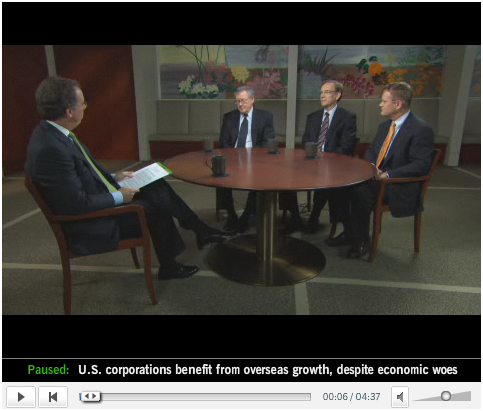 2. U.S. corporations benefit from overseas growth, despite economic woes
2. U.S. corporations benefit from overseas growth, despite economic woes
(Click on image for video)
Kevin Clifford: 2010 has been a most interesting year. Looking forward to 2011, could you spend a few moments talking about the macroeconomic environment that we've experienced this year and some thoughts for next year?
Jim Rothenberg: Kevin, I think most of us who read the newspaper have observed that the economic recovery has been quite slow by historic standards and unemployment has stayed high - much higher, certainly, than the Democrats had hoped - and it presents a continuing challenge.
The other thing I think that's true is that this recovery, while slow, is still proceeding along. But it's also different than the recoveries we've seen the last couple times around, perhaps for quite some time. And that is, this recovery's not being led by the U.S. consumer - in fact, not being led by the U.S. It's really being dominated by the developing countries, who now represent, collectively, more gross domestic product than the U.S. does in the world. And I think our economy [and] particularly our politicians are having a great deal of trouble adjusting to that.
But corporate America, I think, has adjusted fairly quickly. Certainly, those corporations who can benefit from overseas growth - wherever those growing markets are - I think have done remarkably well. And corporate America has also done a good job of cutting back where it had to, of trimming its cost structures - and, of course, that's contributed to unemployment on the one hand but pretty good earnings on the other hand.
So I think you've seen this sort of standoff, if you will, between an environment that is fragile, where the Federal Reserve is keeping interest rates quite low, [and one] where corporate profits have been pretty good. And the result has been an S&P 500 return, at least so far, that probably is a little better than people thought it would be.
Kevin Clifford: OK. Rob, let's shift to you. You spend a lot of your time focused on the world outside the United States. Can you take us around the world quickly?
Rob Lovelace: Sure. I think Jim alluded to the main part of the story right now, which is that the U.S. economy is not the driver in the recovery. We had an inventory cycle, but we really haven't had the traditional consumer recovery or the capital spending that would normally come with the return in demand. And most of the demand we're seeing is driven in developing or emerging economies.
Europe is kind of a mix. There are parts of Europe that are similar to the United States - periphery Europe that you hear a lot about: Greece, Spain, Ireland, Portugal and the U.K. But there are other parts of Europe. Sweden had a very V-shaped recovery - pretty traditional. Germany has been helped by its export position and a pretty austere fiscal policy that they've had for quite a while. So it's a very mixed story - very country-specific. In aggregate, Europe is not recovering quickly - but doing better than, I think, some people might think here because of the Greek and other headlines that make it feel like Europe's in big trouble. It's very patchy, and Germany's one of the bigger economies there, as are some of the Scandinavians, in terms of the contributions. So it's important to realize that there are good things happening in Europe, especially, as was said earlier, on the corporate level. Many European corporations are quite healthy and doing well because of their position in the worldwide scene.
The positive stories are China, India, some of the other developing countries, and even there it's still a bit mixed. I think everyone realizes that it's positive - that they've gone from purely export-driven economies to much more domestically driven economies - and that's absolutely true of India, which wasn't as much of an export-based economy to begin with. But even in China, it's encouraging to see consumption improving and domestic construction and government spending driving consumption there in a way that's positive for all of the world.
I think there's a competitive spirit that gets people worried about that, but if you had to look at what you'd want to have happen while the U.S. is recovering, it's that someone out there is doing well and is able to keep the global economy moving.
***
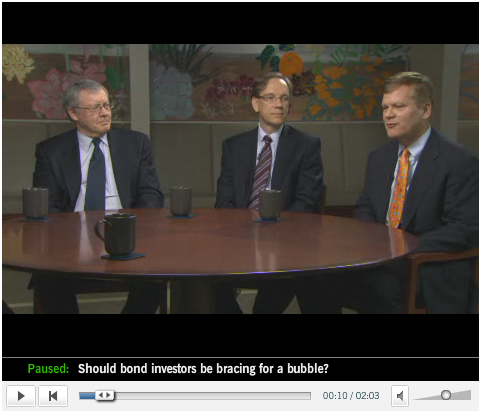 3. Should bond investors be bracing for a bubble?
3. Should bond investors be bracing for a bubble?
(click on image for video)
Kevin Clifford: Jim, global fixed-income markets: What would you like to talk about?
Jim Mulally: Well, the most important point is how healthy they are now. And when you consider that 18 months ago credit markets were in chaos, now there are amazing amounts of liquidity; credit markets are open to borrowers. Mortgage-backed markets are still dependent on agency guarantees; there really hasn't been a recovery outside of that. But generally, they're in very, very good health.
Now, there are some people who argue that we're in some sort of a bubble as far as bond markets go, and I've really resisted using that term. The reason is, to me, words matter - and most people really do know what a bubble means. A bubble typically has certain aspects to it. It's assets rising in price without any particular fundamental backing to their rise. Secondly, people think they can get rich on those assets. And third, it usually includes some aspect of leverage. If you take the [U.S.] housing bubble, that's just by definition, since people are taking mortgages to purchase houses that, in many cases, they really shouldn't have purchased.
Bond funds aren't like that. It is true: A lot of money is flowing into bond funds. But that's largely because people can't really live with virtual 0% short-term rates. Whether they're in CDs or money market funds, they're being forced out into the longer end of the curve. And that means that they are taking some price risk; there's no question about that. And eventually, interest rates will rise - they always do. It's a cyclical phenomenon. And when that happens, some people, I'm afraid, will be disappointed; they will realize that this was not a cash fund and the price will go down if interest rates rise.
But the fact is, the possibility of losing tremendous amounts of money, to me, is quite low. So it's not really fitting into what people would traditionally call a bubble.
***
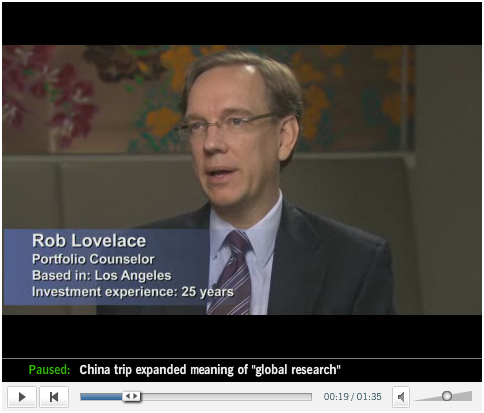 4. China trip expanded meaning of "global research"
4. China trip expanded meaning of "global research"
(click on image for video)
Kevin Clifford: Rob, you were just in China with a large group of your colleagues. Can you give our viewers some flavor of what that trip was all about?
Rob Lovelace: We had slightly over 80 investment professionals. We visited four cities in Asia - Beijing, Shanghai, Taipei and Hong Kong - and then reconvened in Hong Kong after having visited more than 90 companies. That in itself probably doesn't surprise people, because we pride ourselves on having global capacity. We have a major office in Hong Kong, and we visit companies all the time.
I think what really highlights the difference in what we do and how we do it is that in addition to our folks based in Asia and our folks based in Europe and our folks based in the U.S. who look at global companies, we also had a number of people who basically spend most of their time looking at only U.S. companies, and maybe don't necessarily invest in companies, certainly, based in Asia, but they need to understand what's happening in the world.
So, while I know a lot of our competitors have offices abroad, my exposure to them has shown that they tend to have people based in Asia who invest in Asia and based in Europe who invest in Europe, and they maybe talk to each other in a conference call. But it's pretty rare when you take the U.S. team over to Asia to have them understanding what's happening not just in China but in the region - we had companies from India come up, for example - to then understand the knock-on impact on companies that are doing business mainly in the United States. I think that's pretty unique.
***
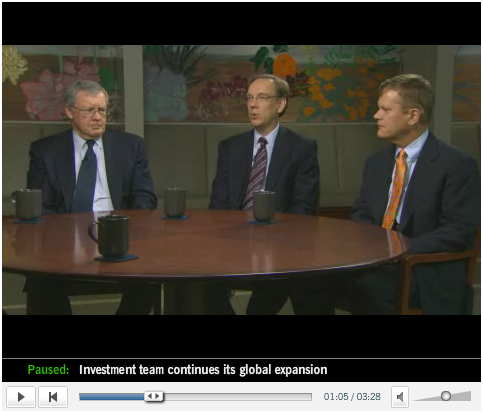 5. Investment team continues its global expansion
5. Investment team continues its global expansion
(click on image for video)
Kevin Clifford: Rob, let's start with you. I think it would be important for the advisors to understand how we think about, and have thought about, growing the research organization through this very volatile period over the last three years.
Rob Lovelace: We have always had a philosophy - I think it was really crystallized in the 1970s - that we should always be growing our investment professionals, in part because the world's always shifting and you want to make sure you've got people looking at what's important now, but also because, generationally, you want to make sure you've got a strong group of people at all phases of their careers in an organization like [The] Capital Group.
So we have continued to hire through this period in our investment team. Most of those people will spend a period of time in one of our larger research offices in the U.S. and Europe, and many of them then end up in places like Asia, where they'll spend a good part of their career.
But that pattern, in and of itself, speaks to the global spirit we want in every analyst: often with multicultural backgrounds, speaking multiple languages, understanding that companies rarely do business anymore in only one country. And so we want our people to have that global flexibility wherever they go, and we're looking for people with interesting backgrounds. In environments like this, you often get to hire some people that not only have those backgrounds but maybe have a little experience and that will fit in well with the team. So we continue to try and hire opportunistically.
Kevin Clifford: Jim, how's this playing out in our fixed-income group?
Jim Mulally: Well, very similarly. Fixed-income, of course, has got a component of both a top-down and a bottom-up part of it. That's just the nature of investing in bond markets. So, in addition to consistently hiring people who are doing research on, whether they're credits or structured bonds, doing individual bond analysis, we also have a whole group, Capital Strategy Research - which we continue to add people to - who are doing economic analysis, accounting analysis, even political analysis and that sort of thing. And the combination of those two in the research group really adds to our capability in the fixed-income management.
Kevin Clifford: Jim, four decades of experience. How unique is this approach to doing global research?
Jim Rothenberg: We have been at this for all the time that I've been here and before - continue to expand, have expanded - in every type of market environment. And we have really emphasized people on the ground in the local markets. A lot of folks do global investing or non-U.S. investing, but they really do it from a U.S. base, and they don't necessarily have as many people out there in the field in the local markets, as familiar with the local markets, as I think we do.
So from my perspective, it's all about hands-on, being there, seeing companies, getting to know those companies as well, if we can, as the ones we've been following in the United States for years.
Kevin Clifford: I'm going to let that be the last word. Thank you all very much for joining us today. This has been terrific. We certainly appreciate you taking your time to share your thoughts with us. And for you, our audience, we hope you found this information to be helpful.
***
Commissions, service fees, management fees and expenses all may be associated with mutual fund investments. Please read the prospectus before investing. Mutual funds are not guaranteed, their values change frequently and past performance may not be repeated.
The statements included here are the opinions and beliefs of the speaker(s) expressed at the time the commentary was recorded and are not intended to represent the opinions and beliefs of the speaker(s) at any other time. This content is for informational purposes only and is not intended to provide any tax, legal or financial advice. Capital International Asset Management (Canada), Inc. or its affiliates assume no liability for any inaccurate, delayed or incomplete information, nor for any actions taken in reliance thereon. The information contained about each product or firm, as the case may be, has been supplied without verification by us and may be subject to change. The Capital International portfolios are available through registered dealers. For more information, please consult your financial and tax advisors for your individual situation.
Capital International Asset Management (Canada), Inc. is part of The Capital Group Companies, Inc., a global investment management firm originated in 1931. The Capital Group Companies, Inc. includes two of the world's largest providers of global/international equity investment services: Capital Research and Management Company (U.S. mutual funds) and Capital Group International, Inc. (global institutional), which also includes Capital Guardian Trust Company. Our funds are subadvised by our affiliates, Capital Research and Management Company and Capital Guardian Trust Company. These groups manage equity assets independently from one another.








